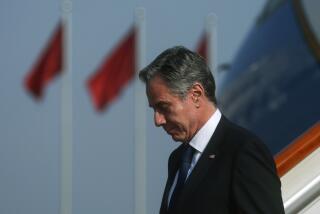Byrd Vows Probe of Spy Case, Cites ‘Incompetence’
- Share via
WASHINGTON — Senate Majority Leader Robert C. Byrd (D-W. Va.) pledged Monday that Congress will conduct a full-scale investigation into what he called “a textbook case in incompetence” by the Reagan Administration that has jeopardized security at the U.S. Embassy in Moscow.
In a speech on the Senate floor, Byrd quoted from an unpublished 1986 Senate Foreign Relations Committee report that blames a “lack of strong management by senior officials” for numerous security flaws in the current construction of the new Moscow Embassy.
“The Moscow Embassy fiasco is a textbook case in incompetence,” he said. “While the Administration talks tough about combatting communism, about pouring our efforts into supporting freedom fighters wherever they may be found, American security is being compromised from the docks of Norfolk to the inner sanctums of our embassy in Moscow.”
Even before it was learned two weeks ago that Marine guards had allowed Soviet KGB agents to roam the existing U.S. Embassy in Moscow, members of Congress had complained on many occasions in the last few years that the Administration was not taking sufficient precautions in construction of a new $191-million embassy complex.
As a result of the failure of Administration officials to heed those warnings, Byrd said, Congress will be forced “to spend a considerable amount of precious time investigating, overseeing and legislating standards and requirements that should not be necessary.”
Panel Sets Hearings
The Senate Intelligence Committee already has scheduled closed hearings to determine whether U.S. intelligence-gathering has been compromised by the breach of security in Moscow, and members of the Senate Foreign Relations Committee are considering public hearings on the impact that the Moscow Embassy problems will have on national security.
Byrd noted that the Administration is planning to build new embassies in six other Communist Bloc nations in the next two years, and he warned that Congress will not provide additional funding for these facilities until it receives assurances that security will be protected. The other new embassies would be in East Germany, Hungary, Bulgaria, Czechoslovakia, Yugoslavia and China.
The new U.S. Embassy in Moscow is being built under the terms of a 1972 U.S.-Soviet agreement that prohibits the Soviets from starting operations in their new Washington embassy until U.S officials move into the new Moscow complex.
According to the Senate Foreign Relations Committee report, completed last Oct. 20, the agreement allows many prefabricated sections to be assembled away from the construction site and without U.S. supervision.
‘Lax Standards’ Seen
The report said that “lax security standards” permitted the American architects to employ a Soviet national, a structural engineer who was temporarily living in the United States, to work on the U.S. Embassy design for approximately five months. After that, it said, the man returned to the Soviet Union and now cannot be found.
“Several attempts have been made to contact this person in regard to the project, and, according to the Department of State, Soviet officials have said that he has died of a heart attack,” the report said.
Meanwhile, State Department spokesman Phyllis Oakley disclosed that the department may broaden its own investigation of embassy security to include embassies other than those in Moscow and Vienna. The Vienna Embassy came under investigation because one of the Marine guards accused of espionage, Sgt. Clayton J. Lonetree, previously served there.
“I don’t have any specifics,” she said, “ . . . but prudence tells us that you need to look. And this is what we’re trying to do.”
U.S. Ambassador to Thailand William A. Brown, who was designated last week to conduct a State Department investigation of the security situation in Moscow, already has returned to Washington and has begun his new duties, Oakley said.
Review Board Weighed
She said that investigators will question all personnel who served in Moscow with Lonetree and Cpl. Arnold Bracy, including those who have been assigned to other embassies. In addition, she said, the Administration is considering appointment of a Moscow Security Review Board.
Oakley refused to respond to a Soviet effort to joke about the situation last week when Foreign Ministry spokesman Gennadi Gerasimov said the situation confirmed the worst U.S. fears of “a Red under every bed.”
“We don’t think that there’s anything funny about this situation,” she said. “We take it in the most serious manner possible. I think that we could expect the Soviet Union to understand that.”
More to Read
Get the L.A. Times Politics newsletter
Deeply reported insights into legislation, politics and policy from Sacramento, Washington and beyond. In your inbox twice per week.
You may occasionally receive promotional content from the Los Angeles Times.










